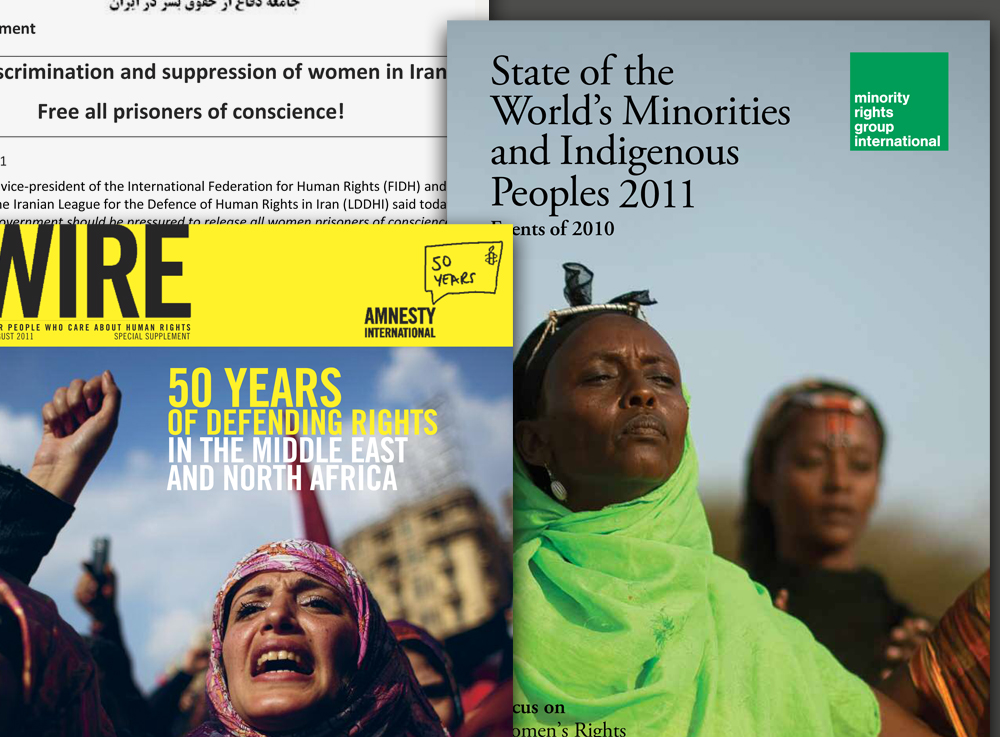 [BWNS, 23 Aug. 2011] GENEVA — Iran’s treatment of its Baha’i citizens has been identified as a major area of concern in three important new surveys carried out by international human rights organizations.
[BWNS, 23 Aug. 2011] GENEVA — Iran’s treatment of its Baha’i citizens has been identified as a major area of concern in three important new surveys carried out by international human rights organizations.
The reports have recently been issued by the International Federation for Human Rights (FIDH), Minority Rights Group International (MRG) and Amnesty International.
The highlighting of the situation of Iranian Baha’is within the broader framework of international human rights violations has been welcomed by the Baha’i International Community.
“Each of these reports surveys a major issue area – minorities, women prisoners, or the Middle East in general – and each accordingly places the ongoing persecution of Baha’is in that context, demonstrating the interconnected and interrelated nature of rights violations,” said Diane Ala’i, the representative of the Baha’i International Community to the United Nations in Geneva.
“We likewise express our grave concern about human rights violations directed at other groups in Iran, such as women, journalists, and human rights defenders, as well as ordinary citizens seeking the right to freedom of expression,” said Ms. Ala’i.
“Release all women prisoners of conscience”
In its report on women prisoners, Paris-based FIDH called on Iran to “release all women prisoners of conscience unconditionally and immediately.”
Iran is currently unjustly holding at least 47 such women prisoners, wrote FIDH on 13 August.
Six Baha’i women are listed by FIDH, including Mahvash Sabet and Fariba Kamalabadi, both serving 20 year sentences for their membership of a national-level ad hoc group that helped attend to the needs of Iran’s 300,000-strong Baha’i community. Last year, they were unjustly convicted of espionage and other trumped-up charges that were wholly related to their practice of the Baha’i Faith.
Also included in the report is Nasrin Sotoudeh, a lawyer who has represented numerous victims of human rights abuses including Baha’is and prisoners sentenced to death for crimes committed when they were minors. In January this year, authorities sentenced Ms. Sotoudeh to 11 years in prison for charges that include “activities against national security” and “propaganda against the regime.” Additionally, she has been barred from practicing law and from leaving Iran for 20 years.
Other cases highlighted by FIDH include those of women’s rights supporter Mahboubeh Karami, serving a three-year prison term; journalist Hengameh Shahidi, jailed for six years; student activist Bahareh Hedayat, sentenced to nine and a half years; and film actress Marzieh Vafammehr, who is being arbitrarily detained.
“The international community should express full support for the Iranian women’s movement and its fight for the establishment of basic freedoms, equal rights and respect for human rights in Iran,” said Karim Lahidji, vice-president of FIDH and President of the Iranian League for the Defence of Human Rights in Iran (LDDHI).
Situation for Baha’is “remained dire”
In MRG’s annual survey of minority populations around the world, published in London last month, the spotlight falls upon problems facing women from minority and indigenous communities.
They are often targeted for rape and other forms of sexual violence, torture and killings – specifically because of their ethnic, religious or indigenous identity.
“The situation for Baha’is in Iran remained dire in 2010,” said the report’s section on Iran, highlighting that the trial and sentencing of Iran’s seven Baha’i leaders took place without “independent observers.”
It also reported that Iranian Baha’is face restrictions on access to education and employment and the “arbitrary destruction of their homes, arrests, and confiscation and destruction of property.”
Amnesty International – in a special supplement to its Wire magazine on the theme “50 Years of Defending Rights in the Middle East and North Africa” – observed that Baha’is are among the many religious minorities that populate the Middle East “sometimes regarded with deep-seated suspicion and hostility that make them vulnerable to abuses of their human rights.”
The three reports can be read in full at the following URLs:
International Federation for Human Rights
Minority Rights Group International
Baha’i World News Service coverage of the persecution of the Baha’is in Iran
The Baha’i World News Service has published a Special Report which includes articles and background information about the seven Iranian Baha’i leaders – their lives, their imprisonment, trial and sentencing – and the allegations made against them. It also offers further resources about the persecution of Iran’s Baha’i community.
Another Special Section includes articles and background information about Iran’s campaign to deny higher education to Baha’is. It contains news of the latest developments, a summary of the situation, feature articles, case studies and testimonials from students, resources and links.
The International Reaction page of the Baha’i World News service is regularly updated with responses from governments, nongovernmental organizations, and prominent individuals, to actions taken against the Baha’is of Iran.
The Media Reports page presents a digest of media coverage from around the world.
—
Source: http://news.bahai.org/story/846
August 24, 2011 6:40 am
what is being done – report after report for 30 odd years- stop the violation if you care. how long does this misery and injustice have to go on for – 300,000 individuals are suffering every day of their life.